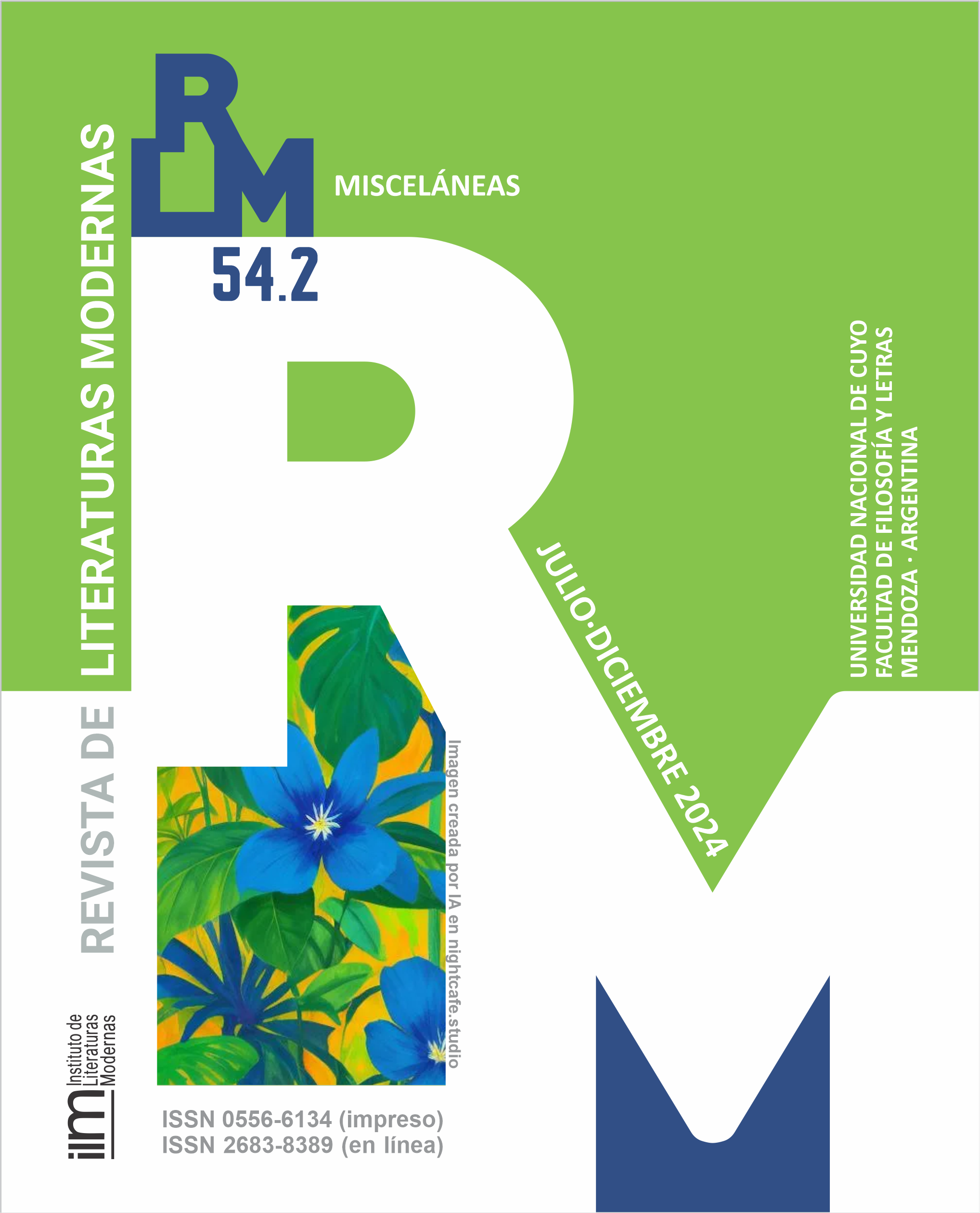Friedrich Heinrich Jacobi's Woldemar, seen through the lens of René Girard’s Deceit, Desire, and the Novel
Keywords:
desire, internal meditation, deviated transcendency, masochism, conversionAbstract
The link between the philosophical works and the literary works written by Friedrich Heinrich Jacobi has been emphasised repeatedly and from many different perspectives. The aim of this paper is to analyse one of Jacobi's novels, Woldemar, with the concepts elaborated by René Girard in his book Deceit, Desire, and the Novel. Girardian mimetic theory, which —as far as we know— has not yet been employed for a substantial study of Jacobi's thought, can provide a new understanding of the issues explored by the German author. The hypothesis we intend to demonstrate is that the novel Woldemar is structured by what Girard calls ‘internal mediation’. The internal mediations between Woldemar, Henriette and Allwina (three characters of the novel) are not, however, redeemed in what Girard calls ‘conversion’. The internal mediation between Woldemar and Henriette does indeed go through a process close to conversion, but, as we will try to show, Allwina's character does not lose her role as an internal mediator. A Girardian analysis of the novel Woldemar makes it possible to link Jacobi's distinctive critique of philosophical nihilism with a literary exposition of what, in Girard's terms, is called ‘deviated transcendency’.
Downloads
References
Bollnow, O. (1933). Die Lebensphilosophie F. H. Jacobis. W. Kohlhammer Verlag.
Cruz Cruz, J. (1993). Razones del corazón. Jacobi entre el romanticismo y el clasicismo. EUNSA.
Di Blasi, L. (2015). Within and Beyond Mimetic Desire. En P. Antonello & H. Webb (Eds.), Mimesis, Desire and the Novel. René Girard and Literary Criticism (pp. 39-53). Michigan State University Press.
Diccionario Jacobi en línea (26 de julio 2024). Friedrich Heinrich Jacobi Wörterbuch Online. https://jwo.saw-leipzig.de/
Fetzer, D. (2007). Jacobis Philosophie des Unbedingten. Ferdinand Schöningh.
Girard, R. (1985). Mentira romántica y verdad novelesca. (Trad. de Joaquín Jordá). Anagrama.
Hampton, A. J. B. (Ed.). (2023). Friedrich Heinrich Jacobi and the Ends of the Enlightenment: Religion, Philosophy, and Reason at the Crux of Modernity. Cambridge University Press.
Heinz, J. (1995). Wissen vom Menschen und Erzählen vom Einzelfall Untersuchungen zum anthropologischen Roman der Spätaufklärung. Walter de Gruyter.
Ivaldo, M. (2003). Introduzione a Jacobi. Laterza.
Jacobi, F. H. (1998ss). Werke. Gesamtausgabe. Edición de K. Hammacher & W. Jaeschke. Felix Meiner Verlag. Citado como JWA.
Jonkers, P. (26 de julio 2024). Du. Jacobi-Dictionary Online. Recuperado el 26 de julio de 2024 de https://jwo.saw-leipzig.de/articles/0be12786
Knode, F. (2024). Literarische Anthropologie und empfindsame Idyllik. Zum Verhältnis von Literatur und Philosophie im Erzählwerk Friedrich Heinrich Jacobis. Transcript Verlag.
Lauth, R. (1971). Fichtes Verhältnis zu Jacobi unter besonderer Berücksichtigung der Rolle Friedrich Schlegels in dieser Sache. En K. Hammacher (Ed.), Friedrich Heinrich Jacobi. Philosoph und Literat der Goethezeit (pp. 165-208). Vittorio Klostermann.
Lauth, R. (1973). Friedrich Heinrich Jacobis Allwill und Fedor Michajlovič Dostoevskijs Dämonen. Russian Literature 2, no. 2, pp. 51-64.
Nicolai, H. (1971). Jacobis Romane. En K. Hammacher (Ed.), Friedrich Heinrich Jacobi. Philosoph und Literat der Goethezeit (pp. 347-360). Vittorio Klostermann.
Ortlieb, C. & Vollhardt, F. (Eds.). (2021) Friedrich Heinrich Jacobi (1743-1819). Romancier–Philosoph–Politiker. Walter de Gruyter.
Sandkaulen, B. (2000). Grund und Ursache. Die Vernunftkritik Jacobis. Wilhelm Fink Verlag.
Schick, S. (2006). Vermittelte Unmittelbarkeit. Jacobis ‘Salto mortale’ als Konzept zur Aufhebung des Gegensatzes von Glaube und Spekulation in der intellektuellen Anschauung der Vernunft. Königshausen & Neumann.
Schick, S. (2019). Die Legitimität der Aufklärung. Selbstbestimmung der Vernunft bei Immanuel Kant und Friedrich Heinrich Jacobi. Vittorio Klostermann.
Sommer, K. (2015). Zwischen Metaphysik und Metaphysikkritik. Heidegger, Schelling und Jacobi. Felix Meiner Verlag.
Villacañas, J. L. (1989). Nihilismo, especulación y cristianismo en F. H. Jacobi. Un ensayo sobre los orígenes del irracionalismo contemporáneo. Anthropos/Universidad de Murcia.
Downloads
Published
How to Cite
Issue
Section
License
Copyright (c) 2024 Federico Vicum

This work is licensed under a Creative Commons Attribution-NonCommercial-ShareAlike 4.0 International License.






